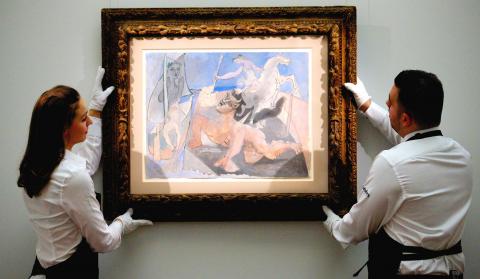A Paris street scene painted by Camille Pissarro sold for the equivalent of US$32.1 million at a London sale on Wednesday, almost five times the previous record for the Impressionist master at auction.
The Danish-French painter’s Boulevard Montmartre, Matinee de Printemps, widely considered to be one of the most important Impressionist works to come up for sale in the last decade, went under the hammer at London’s Sotheby’s auction house.
The 1897 painting, an elevated view of a typical spring scene on the famous Paris thoroughfare, was originally owned by Jewish industrialist Max Silberberg, who was based in Breslau.

Photo: AFP
The Nazis forced him to get rid of his entire collection, and he later died in the Holocaust.
The painting was restituted to his family in 2000.
“It is an honor to be entrusted with offering the greatest work by Camille Pissarro ever to appear at auction — a work that encompasses such a richly painted canvas and a supremely elegant composition,” said Helena Newman, Chairman of Sotheby’s Impressionist & Modern Art Department Europe, prior to the sale.
“The appeal of these extremely desirable attributes to discerning collectors is enhanced by the painting’s history of having been housed in a collection as important as Max Silberberg’s,” she added.
The auction also saw the highest price for a Vincent Van Gogh painting at auction in the British capital for 25 years when a bidder fought of competition from six rivals to secure L’Homme est en mer for US$27.5 million. The work features a woman cradling a baby as she sits next to a fire.
Record prices were also achieved for a print by Cubist master Picasso and for a work on paper by Swiss sculptor, painter and draughtsman Alberto Giacometti.
Two weeks of London auctions kicked off on Tuesday, when paintings by Picasso, Rene Magritte and Juan Gris pushed a sale at Christie’s to a record for London of nearly US$277.8 million.
Gris’s still-life Nature Morte a la Nappe a Carreaux (“The Checked Tablecloth”) led the way, selling for US$56.7 million to smash the world auction record for the Spanish artist.

In the March 9 edition of the Taipei Times a piece by Ninon Godefroy ran with the headine “The quiet, gentle rhythm of Taiwan.” It started with the line “Taiwan is a small, humble place. There is no Eiffel Tower, no pyramids — no singular attraction that draws the world’s attention.” I laughed out loud at that. This was out of no disrespect for the author or the piece, which made some interesting analogies and good points about how both Din Tai Fung’s and Taiwan Semiconductor Manufacturing Co’s (TSMC, 台積電) meticulous attention to detail and quality are not quite up to

April 28 to May 4 During the Japanese colonial era, a city’s “first” high school typically served Japanese students, while Taiwanese attended the “second” high school. Only in Taichung was this reversed. That’s because when Taichung First High School opened its doors on May 1, 1915 to serve Taiwanese students who were previously barred from secondary education, it was the only high school in town. Former principal Hideo Azukisawa threatened to quit when the government in 1922 attempted to transfer the “first” designation to a new local high school for Japanese students, leading to this unusual situation. Prior to the Taichung First

Chinese Nationalist Party (KMT) Chairman Eric Chu (朱立倫) hatched a bold plan to charge forward and seize the initiative when he held a protest in front of the Taipei City Prosecutors’ Office. Though risky, because illegal, its success would help tackle at least six problems facing both himself and the KMT. What he did not see coming was Taipei Mayor Chiang Wan-an (將萬安) tripping him up out of the gate. In spite of Chu being the most consequential and successful KMT chairman since the early 2010s — arguably saving the party from financial ruin and restoring its electoral viability —

The Ministry of Education last month proposed a nationwide ban on mobile devices in schools, aiming to curb concerns over student phone addiction. Under the revised regulation, which will take effect in August, teachers and schools will be required to collect mobile devices — including phones, laptops and wearables devices — for safekeeping during school hours, unless they are being used for educational purposes. For Chang Fong-ching (張鳳琴), the ban will have a positive impact. “It’s a good move,” says the professor in the department of